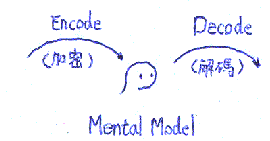從被動接收資訊到主動學習
1. 資訊不等 + mental model encoded

→ U(x) 人人不同
文藝復興思潮: Individualism
2. 歷史的時空性
文化與經濟
文化的價值判斷
Denzau, Arthur, and Douglass North, "Shared Mental Models:
Ideologies and Institutions," Kyklos 47(1994), Fasc.1, pp.3
McCloskey, Deirdew. "Bourgeois Virtue and the History of P and S,"
Journal fo Economic History 58(2) (June 1998): 297
Learning: Not only information; from information to action, from
accumulation of capitals to investment.
從被動接收資訊到主動學習
1. 資訊不等 + mental model encoded

→ U(x) 人人不同
文藝復興思潮: Individualism
2. 歷史的時空性
馬克思說階級; 李登輝說族群
→仍然是以個人為單位
主題:如何跳脫個人?
Ideology: 環境' 與人的影響 外在修飾mental model; 外在因素影響群體價值, 進而影響行為
→ Institution: 有效的去限制行為的東西, 如禮儀
→ Shared mental model/ 移擬心理模型
˙篩濾出同質資訊的機會增強
˙資訊交換強化了同質性
→Organization: Learning以強化同質性, 降低個體間形成的不確定性
˙SMM的影響具有時空性
˙制度變動的可能性 Ex: 科哲典範, 演化, 文化結構
→Cultural learning: Building SMM
1. 接收資訊
2. 建立價值 {Imp.!}
Final question: 文化在哪裡?
Culture → Value Judgement
Case: 東方文明的沉默是金 台灣的會議與上課文化
Case: 需求定理 價格vs需求
 |
Adam Smith: 經濟學的根本→ 道德與倫理 → U(x) → x → Px=y <The Theory of Moral Sentiments> ˙ 聖保羅(軍營 Camp)---The position of the impartial and well-informed spectator ˙ 聖彼得(平民 Common)---Sympathy → Bougeois Virtues <國富論> 從道德學到經濟學的橋樑 Self-love 打破宗教道德的約束, 建立無罪的價值觀 |
Case: 就業或繼續唸書 都逃不了這個問題
˙ 就業: Wage rate(wage/work time) counting
˙ 進研究所: Courage or Prudence? {Imp. for me!}